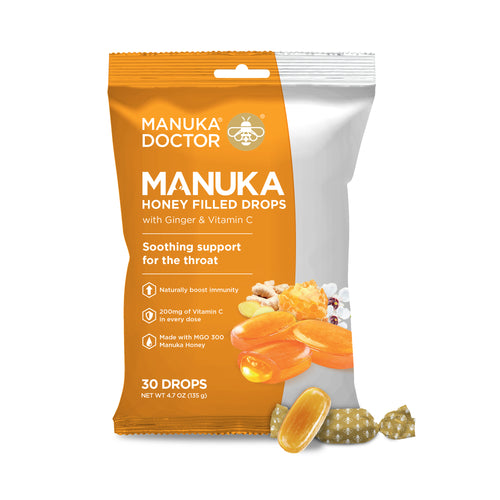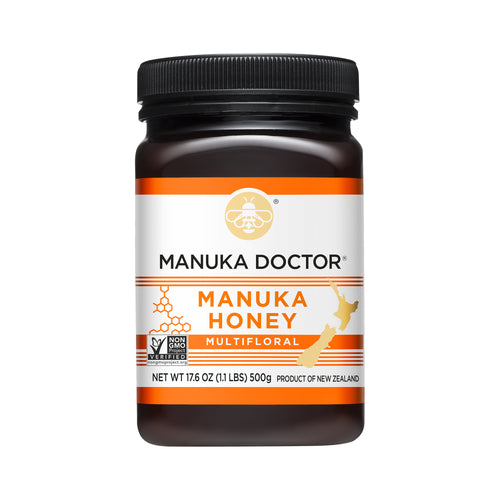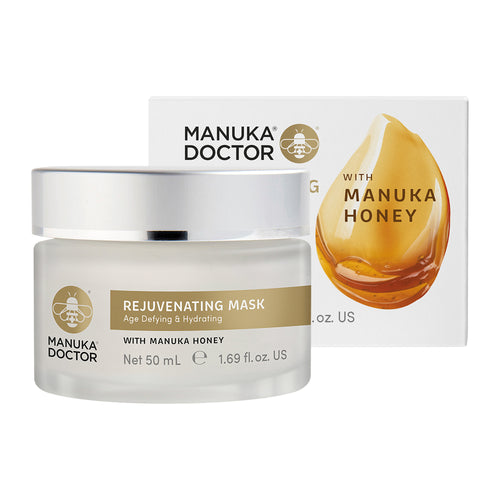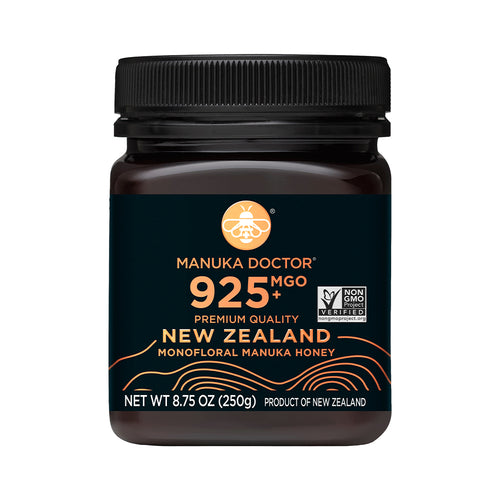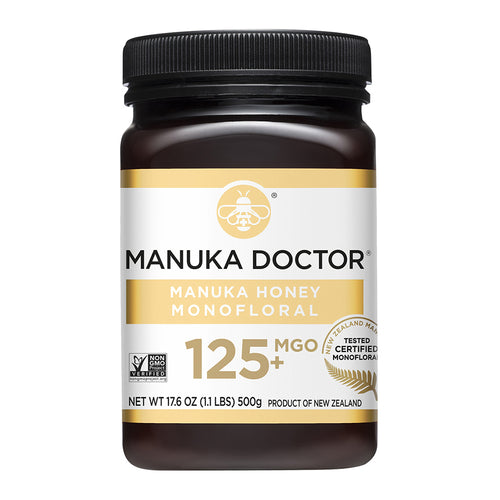Read Time: 3 minutes
Summary:
Honey bees have supported humans for millennia—pollinating crops, sustaining ecosystems, and providing healing honey. But modern threats like habitat loss, pesticides, and climate change are putting them at serious risk. With a third of UK bee species already gone, protecting bees has never been more urgent. Thankfully, awareness and action are growing. Brands like Manuka Doctor contribute by planting Manuka bushes and harvesting honey in bee-friendly ways. Supporting bee-conscious products is a small but meaningful way to give back to these essential pollinators.

Bee Aware, Bee Kind
There is nothing so relaxing as the sound of honey bees as they feast on the densely flowered Manuka bushes of New Zealand. Bees have been helping out humans for thousands of years by pollinating flowers and crops, as well as providing us with delicious and healing honey. Now they’re under threat, and we need to make good our debt by looking after them.
Try a new Manuka recipe today!
It’s said that bees have been making honey for one hundred million years, which is well before humans were on the scene1; the first suggestion of humans eating honey is in the ancient Spanish ‘spider caves’, where there is a painting of a woman gathering it from a tree. Dates aren’t completely clear, but it’s thought to be around eight to ten thousand years ago.2
These days, the bee is vital to our food supply. You see, as they buzz around our fields and gardens gathering nectar and - importantly - pollen as food for the colony, it catches on their bodies. As they move from plant to plant, the pollen fertilises them.
Most of the fruit and vegetables we eat rely on bees for pollination, from tomatoes, potatoes and strawberries to gooseberries and peas. They also pollinate materials we need for other purposes, such as cotton. Even farm animals rely on bees for food, as their feed contains plant material.3

In addition to eating honey, we’ve used it for healing wounds since the times of the Ancient Greeks, Romans and Egyptians. It’s said that Cleopatra - born around 69 B.C. - even bathed in a mixture of milk and honey to maintain her famous beauty, not to mention the fact that some Egyptians even paid their taxes in the precious liquid.4
Closer to home (and to the 21st century), Sarah, the Duchess of Marlborough in the 17th Century, used honey water on her hair to maintain the condition.5
The importance of the bee and the multiple fashions in which it has been our friend is all the more reason to respect it.
But in all sorts of ways humans are harming them; pesticides, loss of their natural habitat and climate change mean that their very existence is threatened.6
The bottom line in the UK is that there are serious threats to the bee; a third of our bee species have disappeared since the 1980s.8 A lack of bees means that our diverse diet would become very boring indeed.
Fortunately, there’s a lot being done to save them, and all sorts of initiatives being launched to help boost population. For example, it was found that a certain class of pesticide is bad for bees, and last year the EU banned outdoor use.9
At home, it’s recommended that you don’t use pesticides, plant bee friendly flowers in your garden and buy bee friendly products. You might even start your own hive.10

Don’t forget, the bee has more celebrity followers than most Instagram influencers. Those fighting to save the bee include Sting - obviously (!), Isabella Rossellini and the actor Morgan Freeman who converted his 124 acre Mississippi ranch into a bee sanctuary.7
There are also many individuals and businesses who both respect and look after bees; Manuka Doctor being one such company.
They are all about looking after the bees and maintaining their natural habitat as well as creating scientifically proven and pleasant to use products, meaning you can have great skin and support bees at the same time.
One way in which the bee population is being aided by Manuka Doctor is by planting more of the Manuka bushes. Their honey and venom are collected gently, without hurting the bees.
Back in your own bathroom, keep skin smooth with the ApiNourish Rejuvenating Face Mask, which contains Manuka Honey and Purified Bee venom, or keep blemishes at bay with the ApiClear Balancing Blemish Cream. Pollution hurts bees and humans; so cleanse skin your with the Anti-Pollution Detoxifying Cleanser.
Whatever product you feel works best for you, bee (deliberate pun) assured that it’s giving our honey producing friends a bit of a boost.
Read more: Is prevention better than cure: Manuka Honey, immune system and more
Sources:
1. 100 MILLION YEARS: http://news.cornell.edu/stories/2006/11/two-studies-bee-evolution-reveal-surprises
2. CAVE PAINTINGS: CAVE PAINTING: https://www.atlasobscura.com/places/man-of-bicorp-cave-painting
3. FOODS: http://www.apicultural.co.uk/the-foods-that-bees-pollinate
4. CLEOPATRAcleopatra: https://www.marieclaire.com/beauty/news/a14366/beauty-makeup-secrets-ancient-egypt/
5. DUCHESS OF MARLBOROUGH: https://www.npg.org.uk/collections/search/personExtended/mp02960/sarah-churchill-nee-jenyns-jennings-duchess-of-marlborough?tab=biography
6. WHY THEY’RE IN TROUBLE: https://friendsoftheearth.uk/bees
7. https://www.forbes.com/sites/trevornace/2019/03/20/morgan-freeman-converted-his-124-acre-ranch-into-a-giant-honeybee-sanctuary-to-save-the-bees/#12c68840dfa5
8. https://www.independent.co.uk/environment/insects-pollination-bees-flies-uk-farming-agriculture-pesticides-climate-change-a8839306.html
9. BANNING PESTICIDES: https://www.independent.co.uk/life-style/food-and-drink/national-honey-bee-day-save-species-decline-pollinators-environment-pesticides-a8461426.html, https://friendsoftheearth.uk/latest/neonics
10. SAVE THE BEES AT HOME: https://thehoneybeeconservancy.org/how-to-save-the-bees/
